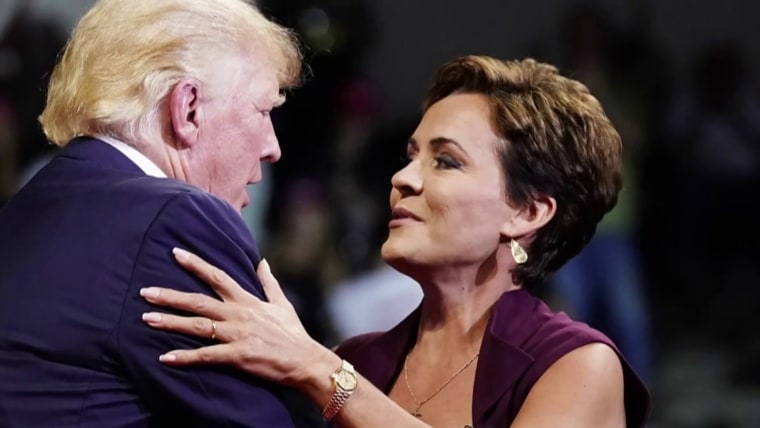Since 2020 Republicans across the U.S. have been undermining democracy by fabricating claims of voter fraud and passing laws to make it harder to vote. But a disturbing new report by Robert Draper in The New York Times Magazine shows how Arizona Republicans are increasingly committed to waging a war on the idea of democracy itself, in part through a bid to call the U.S. only a “republic” and not a democracy. These Republicans think they’re defending American traditions of governance, but they’re not in touch with the history they believe they’re championing, and they’re catalyzing more virulent anti-democratic extremism on the right.
Even though Arizona is only a light red state in terms of voting behavior, the state’s Republican Party has been notably radicalized by Trump and his 2020 disinformation agenda. State legislators have fixated on challenging the election system, and Trump-backed candidates have dominated the state’s recent Republican primaries. But something idiosyncratically toxic seems to be emerging in the state’s conservative scene. Draper says he’s observed among Arizona Republican politicians and activists in the past year a “hostility not just to democratic principles, but, increasingly, to the word ‘democracy’ itself,” which is “distinct from anything I have encountered in over two decades of covering conservative politics.”
One striking way the anti-democracy rhetoric is showing up is through the claim among activists that the U.S. “is a republic, not a democracy.” This is a reactionary Republican narrative that has surfaced from time to time in the past but it seems that something more consistent is congealing in Arizona. Draper quotes Selina Bliss, a precinct committeewoman who made an unsuccessful bid for a state House seat, saying at a meeting: “We are a constitutional republic. We are not a democracy. Nowhere in the Constitution does it use the word ‘democracy.’ When I hear the word ‘democracy,’ I think of the democracy of the Democratic Republic of the Congo. That’s not us.”
And in rallies and meetings across Arizona during this campaign season, Draper found “proactive denigration” of democracy on the right through the “the U.S. is a republic” discourse:
“By the way,” Charlie Kirk [founder of Phoenix-based conservative outfit Turning Point USA] made a point of saying at the fund-raiser in Goodyear, “we don’t have a democracy. OK? Just to fact check. We’re a republic.” At a gathering in Mesa that I attended in July, held by the conservative group United Patriots AZ, the evening’s host, Jeffrey Crane, asked the audience, “Are we a democracy?” They responded loudly: “Nooooo! Republic!”
In other words, in the heart of one of the more energetic hotbeds of Trumpist Republican activity in the country, the claim that the U.S. is a republic instead of a democracy is becoming a common mantra. But the narrative involves a rhetorical sleight of hand to cloak an extremist agenda of minority rule in the guise of fulfilling what the founders wanted.
As scholar George Thomas of Claremont McKenna College has pointed out, the founding generation did describe the American experiment as a republic — a form of government in which a state is ruled by representatives of the citizen body — but didn’t see it at odds with or mutually exclusive from democracy.
The founders were opposed to direct democracy — people representing themselves instead of through elected representatives — at least in part because they believed it couldn’t scale. And they were suspicious of unchecked democracy because they feared, among other things, that a majority could be tyrannical and do away with individual rights. They accounted for that through a system of checks and balances. But overall they still believed in popular rule — and saw democratic principles as coexisting with republican ones.
“There’s really no difference, in the present, between a ‘republic’ and a ‘democracy’: Both connote systems of representation in which sovereignty and authority derive from the public at large,” wrote New York Times columnist Jamelle Bouie in 2019 when dismantling a previous instance of the republic-not-a-democracy narrative.
As Thomas argued in an essay in The Atlantic, James Madison and Alexander Hamilton used the word “democracy” to refer to just governance under their republican vision, and in the 19th century Abraham Lincoln used the terms “democracy” and “constitutional republic” interchangeably.
Of course, none of this to say that the founders’ idea of who constituted “the people” — mainly white men — didn’t undermine actual popular rule. But the idea of popular rule was alive at the time and baked into the design of the government, and ultimately its promise has been a key premise for the expansion of the franchise and civil rights over time.
The agenda of the Arizona Republicans is to create a mutually exclusive dichotomy between democracy and republic, and that use that dichotomy to serve the right’s political goals. The republic distinction isn’t meant to spark a scholarly debate, but rather to disparage the very idea of democracy as desirable. And it’s a springboard for the GOP’s multi-pronged agenda to undermine democratic rule and possibility in the U.S., which includes assaulting voting rights, questioning the trustworthiness of the election system, pouring immense resources into and strategic emphasis on the counter-majoritarian aspects of the U.S. government, like the Senate, and using radical and unelected judges to play an increasingly powerful role in American political life.
Depending on how the Republican Party evolves and how effective it is at implementing its agenda, these programs may push the U.S. toward entrenched minoritarian rule. But of course if the GOP’s most popular politician were to achieve his dream of autocratic rule, it would be safe to say that the U.S. would be neither a republic nor a democracy.
